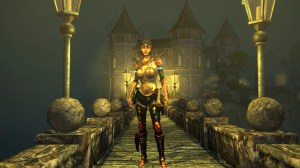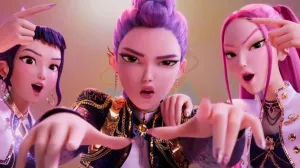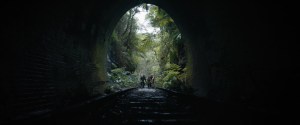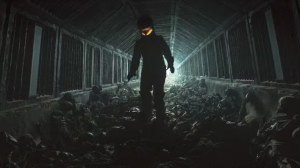
Today is launch day for Oxenfree, the first game out of independent startup Night School Studio. While players will be experiencing the teen-thriller adventure game for the first time, this is the end of a long journey for the game’s creators.
Videos by ComicBook.com
“I am on pins and needles because we’re hours away from launch,” Night School CEO Sean Krankel told me when he spoke to ComicBook.com yesterday. “It really feels surreal. The game has been so personal and everybody’s sweat and bled over it for the last year and a half and it’s been pretty much inside of that studio, and now for it to get shared with the entire world just feels awesome, it’s really exciting.”
In Oxenfree – written by Krankel’s cousin, Adam Hines, who also wrote the critically-acclaimed graphic novel Duncan the Wonder Dog – players take control of a teenaged girl named Alex, who sets out for an evening of fun with her friends and her new stepbrother, Jonas. Things don’t go as planned, and what follows is, as Krankel describes it, “a coming-of-age story where the player gets to determine how their character comes of age.”

“We’ve seen a million coming-of-age stories in comics and film and TV, but in games you don’t really see it that much,” Krankel explains. “So the thought of allowing players to influence a relatable character during some pretty formative moments of her life was interesting.
“That said, we still were like, ‘We don’t want it to just be this wah-wah sort of emo game,’ because we are not that type of a studio at all. So we were like, ‘Let’s make it feel not necessarily like horror, but like a kind of attempt at a supernatural story.’ So we took a lot of inspiration from how the original Poltergeist kind of treated that, where it was not blood and guts and jump scares. The first half of Poltergeist, they’re kind of having fun with those ghosts and they’re like, ‘What is this?’ and it gives you that Spielberg, butterfly in the stomach kind of feeling, and a sense of wonder.
“So that’s what we wanted to do. We just thought games haven’t done that a lot so it would be a lot of fun to give players that feeling of … these beings that you’re dealing with, are they on your side? Are they not? I don’t know.”

The idea to set the game on Edwards Island, home to a decommissioned military base, was partly inspired by another 1980s film, and some real world history.
“Adam and I went up to this 30-year reunion party thing that they did for The Goonies, and went on a bunch of hikes when we were there and started to find some really weird stuff like in the trees,” Krankel says. “There would be grown-over radar stations and then we went, ‘Oh, well, that’s interesting, was this just American paranoia or were these actual functioning things?’”
“So we started to do some research…actually there are a bunch of de-commissioned military islands off the coast. And there were actual Japanese subs getting extremely close to the shore. And one, which is not talked about very much, but one fired a rocket into a Little League field in Oregon in like 1942 or ’43 at night, and luckily nobody was hurt, but that got really close. The war was super close to us.
“It feels like ancient history to most people, but in reality, 1943 is not that long ago at all. So we thought, ‘I wonder if we take some of those true events and some of the things that were happening in that time and put our kids in a story that is dealing with some of the ripple effect of that and tell it in a supernatural way.’”
Of course, story is only one part of Oxenfree. Gameplay is just as important and, in a genre that has become synonymous with Telltale Games, pushing narrative gameplay forward became a big goal for Night School.
“We definitely know that we’re standing on [Telltale’s] shoulders a bit and using things that they’ve perfected over the last few years,” Krankel says, “and we kind of went, ‘Okay, well, let’s not try to completely redefine those things, but let’s try to find ways that our studio and our mindset can improve on it or modify it.’”
Part of the way Oxenfree tries to improve the adventure game experience is by blending exploration and conversation.

“The first big one was when you look at those games or a lot of branching games, the moment of actual communication is very divorced from the rest of the gameplay,” Krankel explains. “So it’s usually like, I’m walking around, I’m solving a puzzle, I’m doing things, doing whatever, and then I walk into a trigger, and now suddenly I’m watching this cutscene where there’s subtitles, but I’m choosing from these subtitles. And that’s fine, that’s a great, perfectly fine, more passive experience. But we were like, ‘The biggest challenge that might be cool for us to try to overcome is just marrying those two things,’ and going, “All right, let’s do something more naturalistic where the player doesn’t ever get taken out of the ‘gameplay’ and put into a cutscene.
“On the surface, we felt was a pretty simple thing, like, ‘Oh, it’ll be like Limbo and The Walking Dead mixed together. Those two things will just go together like chocolate and peanut butter.’ But in reality, it became a massive challenge”
The Night School team was forced to overcome challenges with how to pace dialogue, and making sure vital narrative points weren’t lost without taking agency away from the player. Maintaining the player’s agency even became a vital part of Night School’s approach to how the dialogue was delivered.
“Now that we’re saying you have all this freedom to walk around and explore as you want, we were like, ‘Let’s make sure that Alex never says a word unless the player makes her say a word,’” Krankel explains. This is intended to be a break from the norm in games with branching dialogue, where choosing a single line can often lead to a long back and forth of predetermined conversation. “You can play that whole game not talking if you want to, which is weird and I don’t recommend it, but you could. Being quiet is always an option. It ballooned out and it made it a much bigger challenge because the way that dialogue works in this game, even though on the surface it feels similar to the Telltale stuff, it’s pretty different.”

Dialogue is one part of a larger theme in Oxenfree, which is communication. Throughout the game, Alex and her friends communicate with otherworldly beings through use of a radio. Having played Oxenfree, I can tell you that hearing these creatures speak in broken radio clips is a truly creepy experience.
“Radios have this magical quality to them that is unfamiliar, and it is weird when you hear a station that’s not fully tuned in, and static is sort of creepy,” Krankel says. “And it’s got an analog feel to kind of interact with it and we’re like, ‘God, all of our needs for the game can kind of be posited onto this.’ So everything from just using radio to listen to stuff to using it like a metal detector to find lots of lots of weird secrets in the world, to even using it like a Zelda ocarina to rip open things in the sky with different sequences of stations.
“That one definitely was not like an immediate ‘ah ha!’ We sort of evolved into that. But now it’s such a weird extra piece of the game that feels so natural to it that we’re super happy we landed on it.”

Oxenfree releases today, but Krankel and Night School plan to expand from the game itself. This week, the studio announced a partnership with Robert Kirkman’s Skybound Entertainment to bring Oxenfree to other media, beginning with a docuseries about the game’s creation, and then perhaps moving into film and comics.
“It’s super exciting,” Krankel says of the partnership. “Initially, what happened was that Robert Kirkman had seen Oxenfree on some site, and he obviously has a lot of experience with narrative driven games through The Walking Dead and the success that they’ve had there. I think, initially, he was drawn to the things that we were doing to evolve how you interact with stories.
“A lot of bigger game publishers had reached out to us initially, when we announced the game, but it was the more traditional model that we kind of didn’t necessarily need,” he continues. “But with Skybound, we’re co-branding the game with them, so they’re helping us market it and get the game out there and communicate the game in channels that we, as a small studio, wouldn’t really be able to otherwise. Getting inside Comic-Con and even print comics and things like that.
“This deal really is about expanding what is the world of Oxenfree and the characters of Oxenfree into film and into graphic novels and into merchandise. We’re in the very early stages of figuring out what that is yet but so far it’s been awesome working with those guys because they’re very creator-focused.”
Krankel originally formed Night School Studio specifically to make the game that would eventually become Oxenfree. Now that the game is complete, he and his team are forced to consider life after Oxenfree.
“We definitely are thinking about that…I would say, for sure, everything that we do, at least for the foreseeable future, will be rooted in story and trying to find ways to make gameplay mechanics rooted in story. Not games where story is bolted onto the sides to support a set of other mechanics,” Krankel says of Night School’s future projects. “We talked about legitimately doing a romantic comedy, we talked about party games, and we talked about maybe even a darker horror thing. The only thing that we know right now for sure is that it will be about applying real game playing mechanics to story.”
Oxenfree releases today as a downloadable game on Xbox One and on Steam. Oxenfree will come to PlayStation 4 in the future. A collector’s edition of the game is also available.








